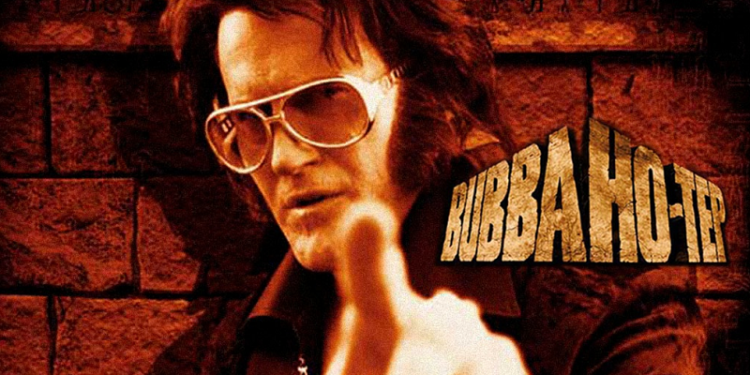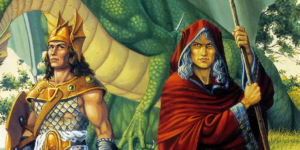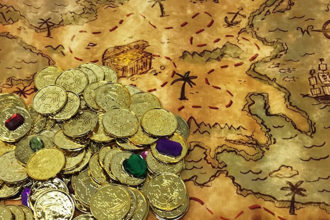Aging Adventurers and Bubba Ho-Tep

“Even the Mona Lisa’s falling apart.”
-Tyler Durden, Fight Club
A lot of people were shocked to learn that the Buffy the Vampire tv show is 20 years old. Even more of them were surprised when they realized the movie is 25 years old. For me, I received a little jolt when I learned that Bubba Ho-tep turns 15 this year. If you are unfamiliar with this cult classic, it revolves around someone who might or might not be an elderly Elvis Presley fighting a mummy in a retirement home with the help of his African-American friend, who might or might not be JFK. The mummy in question focuses on the retirement home because the elderly are less likely to fight back than young, healthy people, and the mummy just isn’t all that powerful, as far as mummies go. If you take the character assignments at face value, then you have one of the best bards in the world joined by a war hero and leader squaring off against a supernatural threat. That’s the backbone of a classic D&D adventure, right there. This movie asks the question, “What happens when adventurers get old?” As the early generations of tabletop gamers continue to age, this is a question worthy of further examination.
Aging has always been challenging in D&D. This was largely dictated by a simple theory: you get worse at physical things (Str/Dex/Con) as you age, but you are better at things involving life experience (Int/Wis/Cha). Sadly, this often meant people would just want to be old in order to powergame their spellcasters. This doesn’t appear in D&D 5e. The general consensus on this point is the venerable team behind 5e realized that not many, if any, campaigns took characters from youth to old age, and it was just a mechanic to be min/maxed, instead. While completely understandable, I think 5e is more capable of handling this than any other edition, thanks to its fairly stripped-down mechanics. Hitting your stat cap in 5e is trivial, relatively speaking. Even if the older system stayed in place, it would be a minimal gain or loss. I don’t think this is a great idea, as the penalties still make playing an old fighter or rogue, for example, less appealing. However, it would be a simple thing to give veteran characters Inspiration regularly, an action surge daily, expertise, or advantage on certain specified rolls. Even if they lost a step (starting over at level one), they would have more to offer the conventional role than a green recruit.
While there will always be the desire to play a sixteen year-old wunderkind or a mid-twenties paragon, some players will want to play characters they identify with more at this time in their lives (source: I see this happen with friends). Characters that have already had a career, achieved some goals, and are at a point where maybe they saw their lives going very differently after they made the major defining decisions of their lives. There are some great examples of these type of characters in popular fiction: King Conan, Deckard Cain, Alcoholic Caramon Majere, Mario Greymist, Raven (all of the Black Company, really), Sirius Black, and so on. These are characters who have already experienced a large portion of life, but opt to get back on the road and pursue some different goals. In some cases, the characters retain their old experience and perform at the same levels, but in other cases, they’ve lost a step or two. For every character that manages to become a wise baroness, it stands to reason that several others can’t move past the trauma, adrenaline, and danger of their adventuring lives.

Let’s quickly look at Alcoholic Caramon Majere. Alcoholic Caramon Majere is a portrait of abuse and dependency. He’s pissing his life away on the back of the man he used to be. He begins the story with his wife, Tika, throwing him out of the house, and the first thing he thinks of isn’t how to become the man he once was, but to consider finding the closest accommodating woman to get back at Tika. He can’t go a day without alcohol, and he only makes it to his first destination on the back of his friend. He’s incapable of taking care of others, let alone himself. It’s not until he’s sold into a life of slavery by one he believes is the villain that has a dark hold over his brother that he becomes an adventurer once more. He has to montage his way through a gladiatorial arena to become the fearsome warrior he once was, and even then it’s clear he’s had to re-learn how to be a skilled warrior. I don’t want to get too hung up here, but it’s important to illustrate that this is something often supported by D&D’s own popular fiction.
Leaving Las Vegas
In Bubba Ho-tep, Bruce Campbell portrays Elvis Presley/Sebastian Haff. According to the story, Elvis grew tired of living the life he was living and swapped places with Sebastian Haff, an Elvis impersonator. Elvis then lived his life as an Elvis impersonator, singing songs, performing, and staying out of the public eye. Unfortunately, a disaster destroyed the documentation proving that this ever happened, making it impossible for him to swap back or reclaim his life after Haff-Elvis died in 1977. Elvis-Haff then suffered a hip injury during a performance that caused him to slip into a coma. Elvis-Haff is now living out his days in a Texas retirement home, unable to perform simple tasks on his own, suffering from impotence, and is in increasingly poor health. He has nothing left – not even his dignity. Here is a man who used to be the King of Rock and Roll, someone everyone either wanted or wanted to be. Now he lays in bed, scarcely able to move, looking away in shame as an attractive caretaker is unable to give him an erection as she applies medicine to his genitals. You can feel the crippling despair that grips him, made all the more crushing by the heartbreaking voice-over that Campbell provides to the scenes.
He is joined by Jack, portrayed by Ossie Davis, who believes he is former U.S. president John F. Kennedy, despite the fact he is a black man. He tells Elvis-Haff that after Lyndon B. Johnson tried to have him assassinated, but failed, he was whisked away to a secret hospital where part of his brain was removed – replaced with a bag of sand – and was dyed black so that no one would ever believe him. Through the eyes of Elvis-Haff we see Jack’s room mimics how JFK’s bedroom looked in the White House, he does indeed have a scar on the back of his head, and he has an impressive number of strange items that would be difficult, at best, for someone who wasn’t president to obtain. His portrayal is fantastic, and tearjerking. As someone who has seen Alzheimer’s effects firsthand, you can feel the confusion and sadness that overcomes Jack at various times throughout the film. Yet underneath this, you can see the spirit of someone who is used to taking charge and facing challenges head on.
To the film’s credit, it never wants to resolve the question of these men being the people they say they are. The intentional ambiguity is central to the narrative of the film. This is compounded by the appearance of the mummy. You see, thieves stole a mummy – to sell on the antique black market – but the thieves crashed and the mummy fell into a river near a nursing home. The mummy then dresses up as a cowboy – something about dressing in the garb of the locals to gain their admiration – and begins to stalk the nursing home to feed on the lifeforce of the elderly. The mummy wasn’t ever one of the most powerful pharaohs or anything, so his mummy powers are pretty weak. When Elvis-Haff and Jack both see the thing stalking the home at night, neither of them are believed by anyone except each other. With a mystery on their hands, the two are given a new purpose in life, and a chance to regain some of their past glory. Instead of wasting away, they have the opportunity to fight against the thing seeking to take their lives, and those of the others around them. Sure, they are going to die anyway, and they know it, but they can at least dictate that they won’t be dying this ONE WAY.
Time Keeps On Ticking
The allure of starting off as a fresh adventurer ready to face the world is definitely still a thing, but I would wager I am not alone in hearing countless friends, acquaintances, and faceless online denizens comment that they have done the “standard fantasy thing.” New settings or systems can foster a sense of wonder and exploration, but it’s the stories that have something to say to the players and their characters that keep people drawn in and wanting to play. As my friends reach middle age, the number of games focused on legacy has exploded – domain management, family honor, base building, and career progression all fall within this category for purposes of this discussion. Characters have children, they have obligations to their families, and most have a career outside the life of adventuring. In some cases this profession is the same as how they adventure – bards, I’m looking at you here – but often time it varies (thanks, tools!) It’s only a matter of time before these same people look for games about fantastic exploration of old age, though I expect we’ll see a boom in games where we all play characters that could be portrayed by the casts of Red and Red 2. Hell, John Wick is no spring chicken, folks.
DMs should be looking at Bubba Ho-tep as a model for games exploring the hitherto relatively unexplored lands of old age. The stakes are not a global apocalypse, the fate of a kingdom, or the upheaval of the status quo, but rather about allowing Elvis-Haff and Jack to free the souls of their dead friends from the mummy and send them to the afterlife. It’s not about becoming stronger and better, but about regaining a sense of self and taking a modicum of control over a situation that can render you helpless. It’s confronting Death head-on. Not trying to outwit him, but to make peace with him and negotiate terms. This can certainly be in the vein of one-last-job or duty-left-undone, but it could also be Dark Souls, Bloodborne, or The Buried Giant, and be about what you have forgotten, left unsaid, regretted, or buried so deep as to always carry the shame with you. This might border on speculative fiction that no one wants to speculate on, I admit.
Life isn’t always sunshine and daisies. It’s also not always facing evil tyrants who oppress you, defending your lands against marauding ogres, or freeing captives. Sometimes it’s about salvaging a situation and finding a way to be yourself again after you have been beaten and broken. Tabletop games are about escapism and immersion, sure, but they can also be about catharsis, processing trauma, and facing very uncomfortable truths. That’s part of what’s great about the medium. As I get older, new things are challenging and scary, and I bet that’s true for others.
If we are evolving, then why not the stories we tell?



